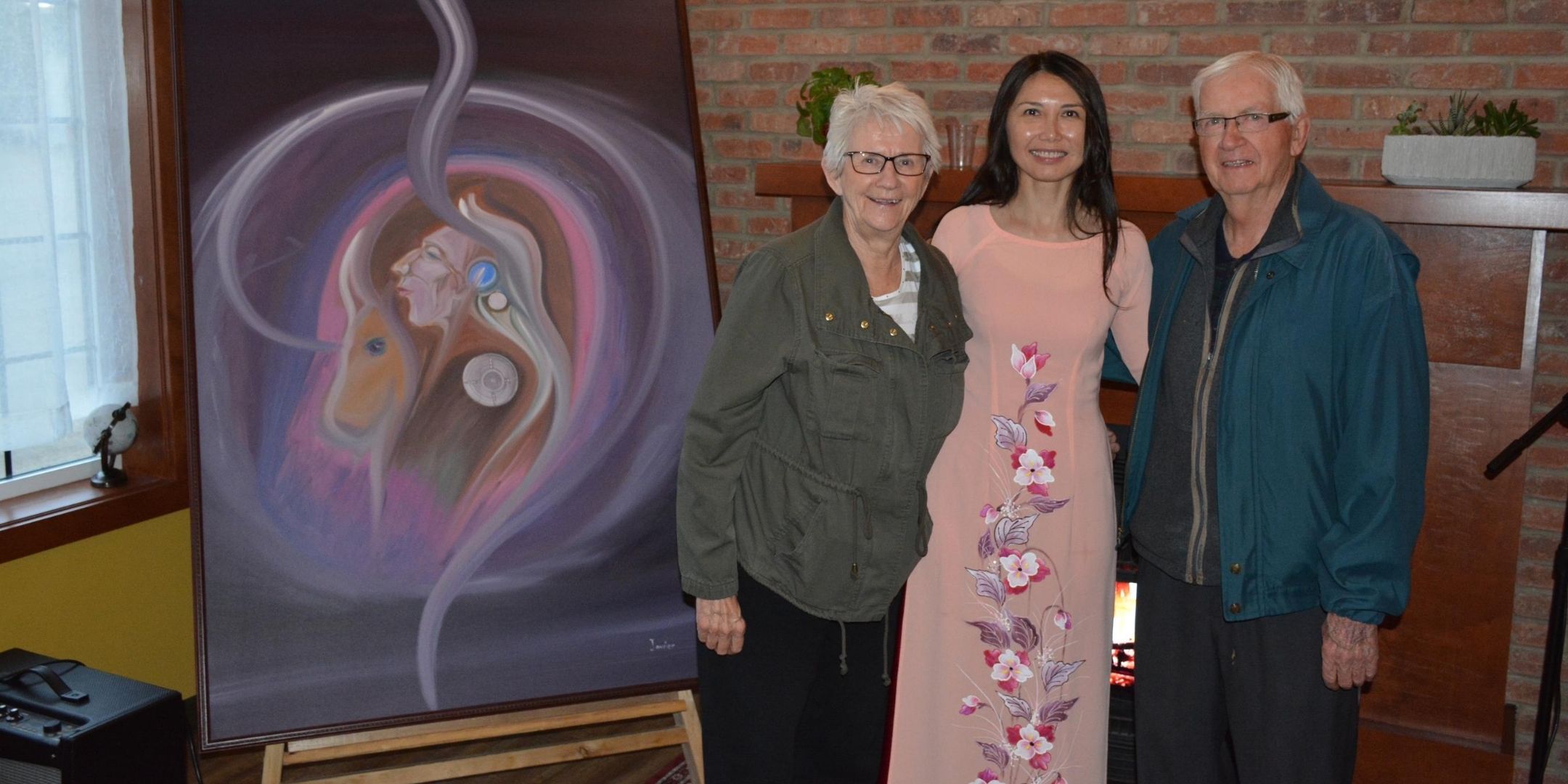MD alumna Nhung Tran-Davies lives to ‘pay it forward’
Sasha Roeder Mah - 22 September 2020

Nhung Tran-Davies at the Zyp Art Gallery, upstairs from her family medicine practice in Calmar, Alberta.
When five-year-old Vietnamese refugee Nhung Tran arrived in Edmonton in 1979, her family’s sponsors welcomed her with a doll. More than 40 years later, that doll has been part of an exhibit by the Canadian Museum of Immigration honouring the refugee experience in our country—and is soon to be the star of a new children’s book by now Nhung Tran-Davies, ’02 MD.
The journey that deposited Tran-Davies, her mother and five older siblings at the Edmonton International Airport that day was a long and difficult one. A seamstress and a widow, Tran-Davies’ mother had grown weary of watching her older children go without food so the younger ones could eat; hearing stories of neighbours killing neighbours over a sack of precious rice. Knowing there was no future for her family under Vietnam’s oppressive regime, she got them space on a wooden fishing boat bound for Malaysia, where they remained for eight months awaiting sponsorship in a refugee camp.
Tran-Davies’ memories of that time are scant. She recalls the pitch and roll of the boat on rough seas, feeling frightened and seasick. She remembers being told that the ship that departed right before theirs capsized, how close her family came to being among those who perished. Most of her memories have been woven from the stories her siblings and mother have shared throughout the years. And listening to those memories, her own future as a storyteller took root.
Building a life in rural medicine
At the same time, Tran-Davies began to dream of a way to give back to the community that had so generously welcomed them. A deep love of science eventually led her in the direction of family medicine, and to the University of Alberta’s Faculty of Medicine & Dentistry.
Here, while pursuing her MD, Nhung met future husband Grant Davies, and together they headed to Saint John, NB’s Dalhousie Medical School to complete their residencies. Their experience serving the small communities there instilled in them a love of rural practice. “In a smaller town, you get to know the people around you so much better,” says Tran-Davies.
Now family physicians in Calmar, Alta., where they also serve as preceptors for medical students, Tran-Davies and her husband are passing that passion for smalltown practice to the next generation. “It’s so special to be able to show how wonderful the relationships are with our patients and our community,” she says.
Tran-Davies and Davies share a practice in a two-storey building they own, which also houses a massage therapist, chiropractor and optometrist, a cafe and the Zyp Art Gallery.
“We’re a family in this building; we consult each other. We share a common goal to help our patients, physically and mentally,” says Tran-Davies.
“I also feel the art gallery is part of that,” she says, adding that the gallery is named in honour of Hank and Tillie Zyp, who were among her family’s sponsors years ago. Along with being a passionate social activist, Hank was also an amazing artist, recalls Tran-Davies.
“Art helps people relax and reflect, and it’s good for the soul,” she says. That goes not only for her patients, who frequently can be found enjoying a quiet moment at the gallery, but also for busy health professionals like herself, she adds.
Sharing stories of courage and kindness
That’s where writing comes in for Tran-Davies, the author of four children’s books, two of which—Ten Cents a Pound and the semi-autobiographical A Grain of Rice—have already been published. The Doll is next.
Tran-Davies’ stories shine a light on the universality of the human experience: We all struggle; we all suffer. But with courage and hope—and the kindness of others—we can meet those struggles head-on.
“Stories have an amazing way of instilling compassion, understanding and respect for one another,” she adds. “I feel the need to write because it helps affect positive change.”
Paying it forward
Storytelling is just one of the ways Tran-Davies advocates for change. To “pay forward” her sponsors’ generosity, she has helped bring two Syrian refugee families to Canada. She was also invited to speak at the UN International Organization on Migration in Geneva in 2016, where the focus was on challenging anti-migrant stereotypes and hate speech in politics and society.
Closer to home, three years ago Tran-Davies founded the Kemosa Scholarship for First Nations, Métis and Inuit Mothers Who Write. “I know I’m lucky,” she says, referring to the privileged position that allows her time and space for writing. “I wanted to help these women write their stories. This is my contribution to reconciliation.”
The scholarship is now shared between Tran-Davies and the Writers’ Guild of Alberta, and anyone is welcome to donate to the fund.
As the next cohort of students prepares to enter the demanding MD program, Tran-Davies shares these words of wisdom, born of the hardship of her youth and the successes since: “A door has opened to you because of your passion and care for humanity. Despite the challenges of the global pandemic, try to appreciate every moment. This shall pass; there will be better days. If you walk with courage, determination and kindness, you will become the doctors your community needs.”